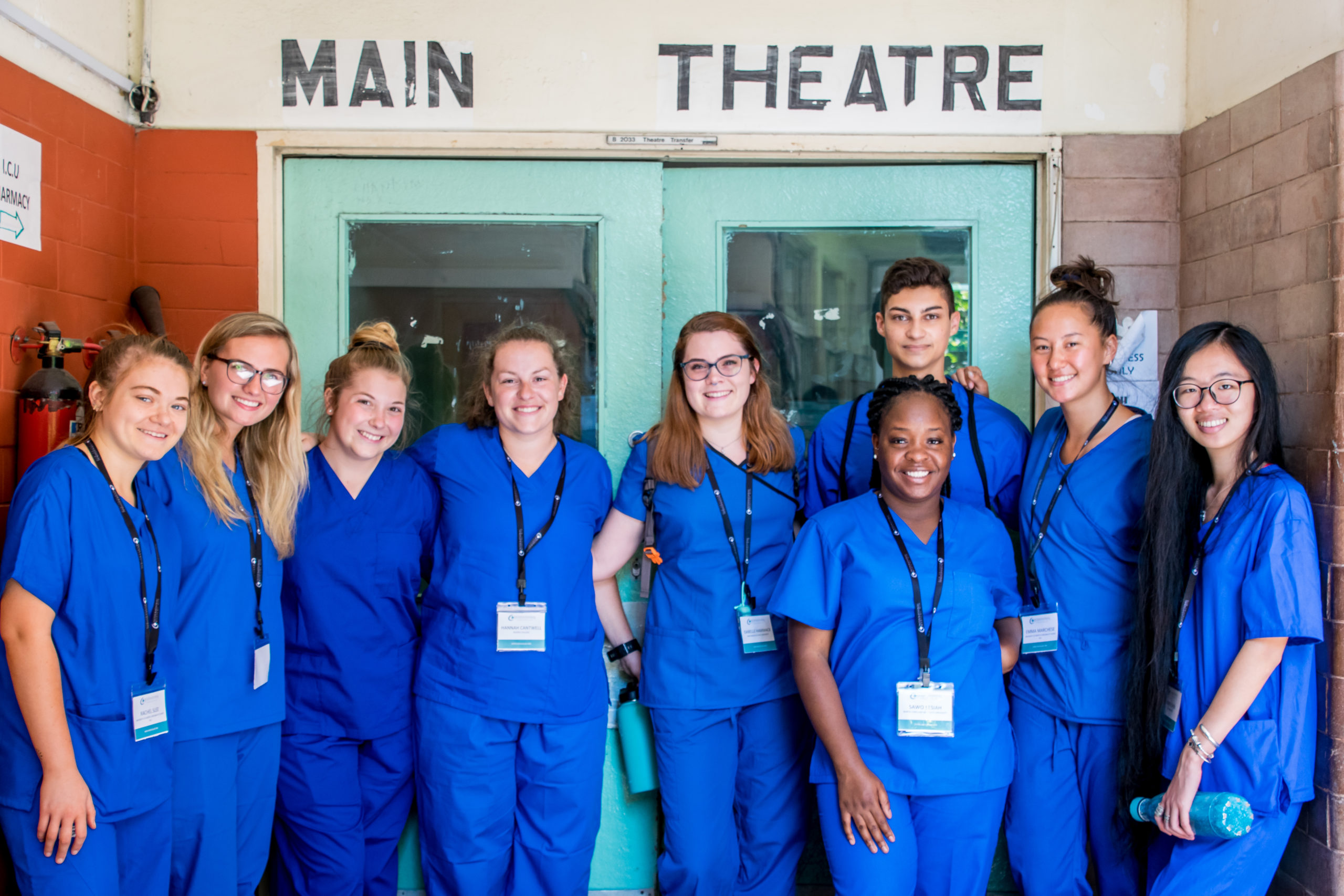Nurse anesthetists are highly trained and specialized nurses who provide anesthesia care to patients before, during, and after surgery. They work closely with surgeons and other medical professionals to ensure that patients receive the best possible care.
Nurse anesthetists receive the highest level of education and undergo the longest and most intensive training of any type of nurse. They are considered one of the topmost trusted professions in the U.S. and enjoy lucrative job prospects and impressive salaries. According to the American Association of Nurse Anesthesiology, CNRAs administer more than 50 million anesthetics every year in the United States.
This article will guide you through how to become a CRNA. We’ll also discuss top CRNA programs, the responsibilities of nurse anesthetists, and how to apply for world-class nursing study abroad programs. If you’re looking for step-by-step details on how to fulfill nurse anesthesia requirements, consider bookmarking this page for reference.
CRNA Overview
Becoming a nurse anesthetist is not for the faint of heart. It requires a lengthy and intensive educational process, as well as passing a rigorous national certification exam. But for those who are up to the challenge, a career as a CRNA can be immensely rewarding.
Before entering into a CRNA program, prospective nurses benefit greatly from pursuing prior healthcare experience or nursing study abroad programs. Programs such as International Medical Aid’s pre-nursing internships abroad give students early experience with patients, healthcare systems, and medical practices from around the world. This type of experience is not only helpful in getting into a competitive CRNA program, but it also provides a unique perspective that will be beneficial throughout your career.
What Does CRNA Stand For?
CRNA stands for Certified Registered Nurse Anesthetist. Nurse anesthetists are advanced practice nurses who provide anesthesia care for patients undergoing surgery or other medical procedures.
What Does a Nurse Anesthetist Do?
Nurse anesthetists work in a variety of settings, including hospitals, surgical centers, and pain management clinics. They collaborate with surgeons, dentists, and other medical professionals to develop anesthesia care plans for patients.
CNRAs are responsible for preoperative assessment of patients, administration of anesthesia, and postoperative management. They also provide pain management services for patients with chronic pain conditions.
How to Become a CRNA
To become a CRNA, you need the experience required to take and pass the CRNA National Certification Examination (NCE). Requirements include completing an MSN or DNP, obtaining your required clinical hours, and passing the appropriate exams. Below, we detail the entire process of fulfilling the nurse anesthesia requirements.
Beginning in 2025, completing a Master of Science in Nursing (MSN) will no long be sufficient to become a CRNA, as the American Association of Nurse Anesthesiology (AANA) will require CRNAs to complete a Doctor of Nursing Practice (DNP) degree. MSNs take 2 years to complete and DNPs take 3 years.
Nurse Anesthesia Requirements
In order to be a CRNA, you must have:
- A Bachelor of Science degree in nursing (BSN)
- An unrestricted registered nurse license
- At least a year’s experience as an RN in a critical care setting is required (varies depending on CRNA program)
- A Master of Science in Nursing (MSN) or Doctorate in Nursing Practice (DNP) from an accredited CRNA program (DNP required as of 2025)
- Certification by the National Board of Certification and Recertification for Nurse Anesthetists (NBCRNA) by passing the National Certification Examination (NCE)
- State licensure to practice, administered by state nursing boards
Now, let’s take a more detailed look at how to fulfill each of these requirements.
Step 1: Complete a Bachelor of Science Degree in Nursing (BSN)
The first step to becoming a nurse anesthetist is to obtain a Bachelor of Science in Nursing (BSN) from an accredited nursing program.
A BSN provides the foundation for advanced nursing practice and prepares students for graduate-level coursework. BSN programs typically take four years to complete and include coursework in anatomy, physiology, pharmacology, population-based healthcare, mental health, and foundations of nursing.
Step 2: Pass the NCLEX-RN
After completing a BSN program, the next step is to take and pass the National Council Licensure Examination (NCLEX-RN). The NCLEX-RN is a standardized exam that all nursing candidates must pass to obtain an RN license.
The NCLEX-RN consists of 75 to 250+ questions that cover a variety of nursing topics, including:
- Managemenclexnt of Care
- Safety and Infection Control
- Health Promotion and Maintenance
- Psychosocial Integrity
- Physiological Integrity
- Basic Care and Comfort
- Pharmacological and Parenteral Therapies
- Reduction of Risk Potential
- Physiological Adaptation
Step 3: Gain Critical Care Experience
Once you have passed the NCLEX-RN, you will be a Registered Nurse (RN) and can begin getting experience working in a critical care setting.
Most nurse anesthesia programs require at least one year of experience as an RN in a critical care setting, such as an intensive care unit (ICU), medical-surgical unit, or trauma center.
The experience you obtain in this phase will shape your understanding of how to provide anesthetic care for critically ill or injured patients and prepare you for the rigors of a nurse anesthesia program.
Additionally, your responsibilities as an RN help determine the competitiveness of your application. Applicants with high-acuity patient experience, such as in an ICU, are often given preference over those with less demanding patient care experience.
Finally, try to enrich your time in critical care with a variety of educational experiences. Seek out leadership roles in committees and consider focusing your attention on specific medical techniques to better differentiate yourself when it comes time to apply for a CRNA program. Ask plenty of questions and take every opportunity to learn from more experienced practitioners.
Step 4: Obtain CCRN Certification
The next step is to obtain certification as a Critical Care Registered Nurse (CCRN) from the American Association of Critical-Care Nurses (AACN).
Earning CCRN certification demonstrates your knowledge and expertise in caring for critically ill or injured patients.
While CCRN certification is not required for every CRNA program, many CRNA programs do require it. CCRN certification is best sought during your time gaining critical care experience. With CCRN certification, you’ll have more options when it comes to applying to CRNA programs, and by getting certified early, you’ll be able to focus on optimizing your applications, rather than scrambling to get certified last minute.
Step 5: Take the GRE Exam
The GRE is a standardized test that is required for admission into most nurse anesthesia programs. The GRE measures verbal reasoning, quantitative reasoning, and analytical writing skills.
GRE scores are used to help assess a candidate’s readiness for graduate-level coursework. The GRE is offered year-round at testing centers around the world. We recommend enrolling in a GRE prep course to help you prepare for the exam and achieve your desired score.
Most schools you will be applying to will list the average GRE score for incoming students. You can compare your score to this metric to determine how competitive your application will be.
Step 6: Apply to CRNA Schools
Now that you have all the prerequisite experience and certification, you can begin applying to CRNA schools! Getting into and completing CRNA school is an exciting yet challenging process.
CRNA programs can be highly competitive, and the application process is arduous. Applicants should consider admissions consulting and advising, which provides individualized guidance and support throughout the application process. Admissions consults can also answer any questions you have about how to become a nurse anesthetist.
The first step is to research schools and make a list of your top choices. (We’ve compiled a list of top CRNA programs below.) When choosing schools, you’ll want to consider location, cost, the program’s teaching sites, and the quality of education.
If you’re thinking, “I need to find CRNA programs near me” then remember to check where the program’s clinical sites will be. Some schools require students to travel to complete their clinical rotations. These clinical sites can be far from the school’s campus, and the costs and logistics of the travel necessary to complete these programs can easily disrupt your plans if you aren’t prepared. However, many students find that the benefits of these rotations, such as exposure to different types of patients and facilities, outweigh the disadvantages.
Finally, research the prerequisites for each of the schools you’re interested in to make sure you meet them. (If you don’t, there’s no sense in applying!) This guide lists the major requirements for applying to CRNA school, however, each school has different requirements (such as college coursework and minimum ICU experience), so make sure to check each school’s website for a complete list of prerequisites.
Step 7: Complete CRNA School
Once you’ve been accepted into a nurse anesthesia program, congratulations! You are now a student registered nurse anesthetist (SRNA)
CRNA school is intense and rigorous. There is an incredible amount of information to learn, and you’ll be expected to apply this knowledge in clinical rotations.
Your CRNA program will likely take 3 years to complete (most programs will be doctoral). You’ll need to pass all your exams, clinical evaluations, and acquire the required clinical hours to graduate.
In order to take your National Certification Exam (NCE), you’re required to have 2,000 clinical hours as an SRNA and a minimum of 600 cases logged. Once your school, the National Board of Certification and Recertification for Nurse Anesthetists (NBCRNA), and the Council on Accreditation of Nurse Anesthesia Educational Programs (COA) have verified your eligibility, you can register for the NCE.
Step 8: Get Licensed and Certified
To become certified, you must pass the National Certification Examination (NCE). The NCE is a computer adaptive exam that tests your ability to engage in entry-level practice.
The NCE covers Basic Sciences, Equipment, Instrumentation and Technology, General Principles of Anesthesia, and Anesthesia for Surgical Procedures and Special Populations.
Once you’ve passed the NCE, congratulations! You may now apply for licensure in your state and enter the profession.

CRNA Roles, Responsibilities, and Skillset
Depending on where you work as a CRNA, your responsibilities may differ. All certified registered nurse anesthetists interact directly with patients, their families, and other medical personnel. You may have a wide range of responsibilities on a daily basis, including:
- Assessments of patients
- Making preoperative anesthetics for patients
- Organizing, managing, and administering medication
- Informing patients about their operation and recovery process
- Monitoring patients and maintaining anesthetic levels during surgery
- Supervising the patient’s recovery from anesthesia
- Developing pain management plans
- Administrative tasks
- Training others
CRNAs need to have a wide range of skills, including:
- Excellent communication abilities
- The ability to work well under pressure
- Excellent organizational and time management skills
- Critical thinking and problem-solving abilities
- A caring and compassionate personality
- Attention to detail
- The ability to work well as part of a team
- The ability to work independently
- A strong work ethic
CRNA Salary and Job Growth
The high demand for nurse anesthetists has resulted in consistent salary increases in recent years. The latest figures show CRNAs make an average of $189,180 a year. Median pay is reported to be $117,670 per year.
How much you’ll make as a nurse anesthetist will depend on factors such as your experience, geographical location, and type of facility. CRNAs with 20+ years of experience will make an average of $26,000 more per year than those with 5 years of experience or less.
The U.S. Bureau of Labor Statistics expects nurse anesthetists to experience job growth of 45% over the next 10 years.
CRNA Colleges / Nurse Anesthetist Programs
Accredited nurse anesthesia programs are typically 3 years long and will prepare you for the National Certification Examination (NCE).
The Council on Accreditation of Nurse Anesthesia Educational Programs (COA) is the main accrediting body for nurse anesthesia programs in the United States.
There are currently 124 accredited nurse anesthesia programs in the United States. These programs offer a variety of educational tracks, including full-time, part-time, and online options.
Nurse anesthetist programs include didactic coursework and clinical rotations. CRNA programs are intensive and demanding, but they prepare you for the challenges of the profession and ensure you have the skills and knowledge needed to provide safe, high-quality care to your patients.
Here are the highest-ranked schools in the U.S. for Nursing-Anesthesia as of 2022:
- Virginia Commonwealth University
- Baylor College of Medicine
- Duke University
- Kaiser Permanente School of Anesthesia – California State University–Fullerton
- Rush University
- Uniformed Services University of the Health Sciences
- University of Pittsburgh
- University of Texas Health Science Center–Houston
- U.S. Army Graduate Program in Anesthesia Nursing
- Georgetown University
Nursing Internships Abroad
CRNA programs require at least a year of critical care experience, and most programs will require community service. Additionally, if you’re applying to the top CRNA programs, you’ll want compelling clinical experiences that distinguish you from other applicants.
International Medical Aid offers nursing internships abroad for undergraduate nursing students, graduates, fellows, and anyone else who wants to gain experience in the field of international health.
As an intern, you’ll have the opportunity to work alongside experienced physicians and nurses, engage in individualized didactic sessions, and enrich your overall perspective of medicine, nursing, and healthcare on a global level. Our interns leave with memories and lessons that last a lifetime, and stories and skills that pique the interests of admissions committees.




